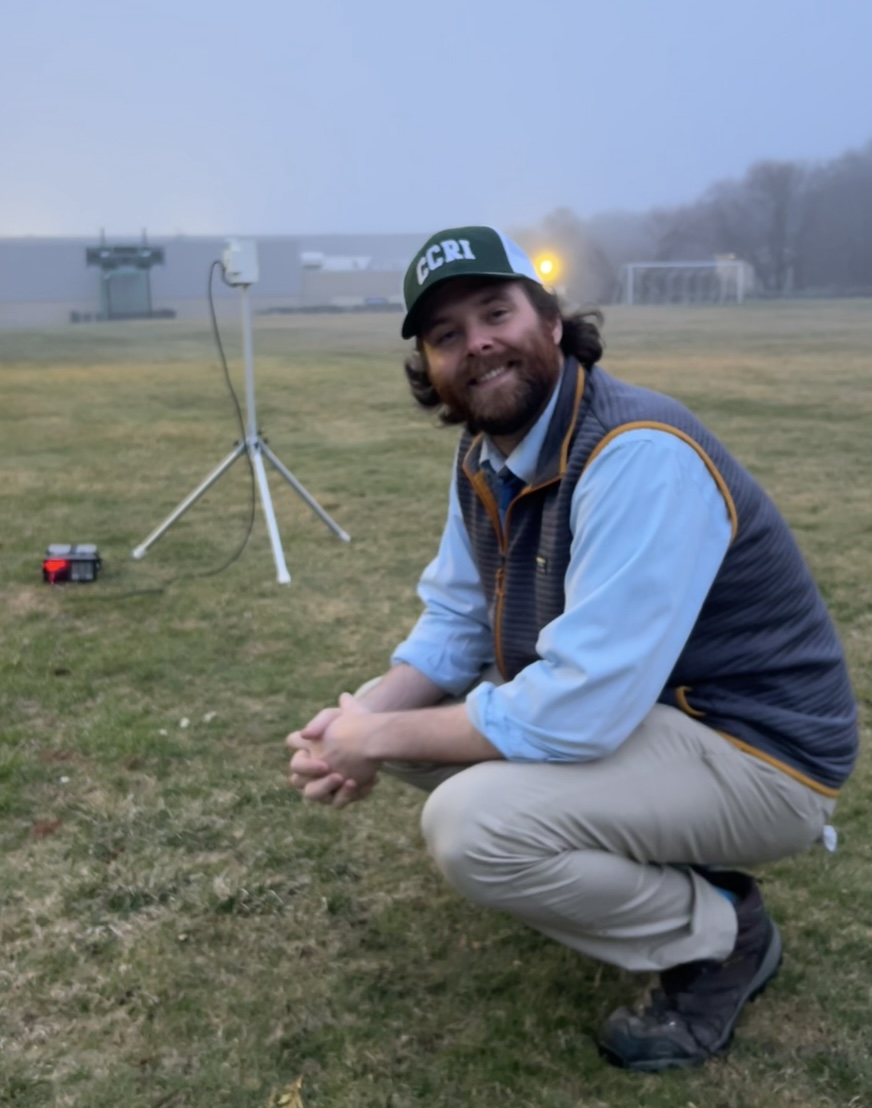Roger M. Hart

- Associate Professor
- : Lincoln
- : 1374
- : [email protected]
Bio
Dr. Hart loves teaching astronomy, geology, oceanography, and physics! He is passionate about engaging students through exploration, investigation, and discovery. He joined the Community College of Rhode Island (CCRI) as a full-time faculty member in the Department of Physics and Engineering in 2018.
As a geophysicist, Dr. Hart is broadly interested in exploring and understanding the physical processes and properties of the Earth, other planets, and their surrounding space environments through quantitative analysis. Additionally, he is interested in applying science and science education to practical avenues that benefit the local community.
Join the adventure! Find Dr. Hart's Spring 2025 courses here, all are welcome!
Office Hours
Spring 2025 Office Hours/Help Hours Spring Session II:
Monday: 11:30AM-1PM; 4:30 PM-5 PM, FL 1374
Tuesday: 9:30PM-10:00PM KN 2226
Wednesday: 11:30AM-1PM; 4:30 PM-5 PM, FL 1374
Thursday: 4PM-5 PM, 9:30-10:00PM FL 1374
Zoom by appointment.
Education
B.S. in Geology, University of Massachusetts Amherst
M.S. in Environmental Sciences, University of Rhode Island
M.S. in Physics, East Texas A&M University
Ph.D. in Environmental Sciences, University of Rhode Island
Classes
Take a look at Dr. Hart's Spring 2025 classes here!
Learning Resources
Take a look at free OER textbooks here!
Selected Publications
*Denotes CCRI student co-authorship.
- *Hart, R., Pereira, K. A., Gryss, M. J., & Vertullo, I. M. (2025). Integrating place-based education & service learning in community college astronomy courses. AAPT Winter Meeting 2025, Astro Poster Session II, St. Louis, MO. https://aapt-wm.secure-platform.com/a/solicitations/85/sessiongallery/3580
- Hart, R., & Cardace, D. (2023). Mineral Indicators of Geologically Recent Past Habitability on Mars. Life, 13(12), 2349.
- *Hart, R., Cardace, D., and Kennedy, H. (2023). Preliminary Magnetic Analysis of Variably Serpentinized Ultramafic Sites in Diverse Tectonic Settings. GP21A-0531. AGU, 2023.
- Hart, R., & Cardace, D. (2023). Preliminary Models of Mineralogies from Near-Surface Water-Rock Simulations at The Nili Fossae Region, Mars. NEGSA, 2023.
- Hart, R., & Cardace, D. (2022). The Case for Inferring Martian Paleo-groundwater Compositions from Trace Minerals in Ultramafic Regolith Contexts. AbSciCon, 2022.
- Hart, R., & Britton, B. (2019). Modeling The Interior of A Super-Earth Candidate From Stellar Metallicities To Infer Geophysical Properties. Bulletin of the American Physical Society, 64.
- Hart, R. & Cardace, D. (2018) Serpentinization-Driven Habitability in Terrestrial Planet Mélange. Terrains. Goldschmidt Abstracts, 2018 956
- Hart, R. & Cardace, D. (2017) Modeling Late-State Serpentinization on Enceladus and Implications for Methane-Utilizing Microbial Metabolisms, Abstract P43B-2885, presented at 2017 Fall Meeting, AGU, New Orleans, LA, 11-15 Dec.
- Hart, R. & Cardace, D. (2017) Terrestrial Planet Serpentinization in Mélange Terrains, Planetary Geology (Posters), Geological Society of America Abstracts with Programs. Vol. 49, No. 2 doi:10.1130/abs/2017NE-291088
- Stebbins A, Algeo T, Hart R, Krystyn L, Williams J, Brookfield M & Hannigan R (2016) The Early Triassic Sulfur Isotope Curve of Seawater Sulfate from Marine Carbonates in the Neo- Tethys. Goldschmidt Abstracts, 2015 2976
Research Focus
Research that Dr. Hart works on is tailored to each individual student's interest broadly in the fields of:
(1) Geophysics: Investigating planetary analog field sites, such as ultramafic systems, lava tubes, alpine settings, and impact
craters using magnetic, mineralogical, and radiometric surveys and observing space
weather and related modeling, using magnetometers and ionospheric monitors. Computer
simulations are used to model these locations and apply these parameters and observations
to sites witin the Solar System.
(2) Astronomy: Employing comparative planetary science to understand the habitability of planets, small icy worlds, and super-Earth and Mega-Earth exoplanets, striving
to answer one of astronomy's most fundamental questions: “Are we alone?” by utilizing astronomical observations, and running computer simulations. Ground-based
observations are primarily are focused on rocky Exoplanet search projects employing
a small 8" telescope, using transit photometry.
(3) Coastal Ocean Science: Observations and investigations in buoy-less coastal estuaries and the nearshore photic zone (shallower than ~100 m). Research
includes using CTD (Conductivity, Temperature, Depth) sensors, collecting discrete
water samples at various depths for chemical analysis (e.g., dissolved oxygen, nutrients,
and carbon content), and employing acoustic profilers, such as echo-sounding devices,
for bathymetric studies.
Project funding has been generously supported, especially student projects, by the NASA RI Space Grant Consortium. Contact [email protected] for more information if you'd like to get involved!
Areas of Expertise
Geophysical examination of planetary analog settings and worlds, applying comparative planetary science techniques to rocky planets and icy worlds to infer habitability based on physicochemical properties.
Additional Information (Links)
Keep the adventure going and explore our planet and the universe!
Students at CCRI who are interested in majoring in either Geology or Physics and want to remain instate can transfer to the University of Rhode Island. There is
a Joint Admissions Agreement (JAA) with URI in both Geology and Geological Oceanography and Physics.The first two years
of your Bachelor's degree will be completed at CCRI all while earning your Associate
degree. Once transferred to RIC or URI, JAA students receive the following benefits:
- Up to 30% discounted tuition at RIC or URI depending on your CCRI GPA
- Waived application fee
- Conditional acceptance to URI or RIC
- Personalized advising at CCRI, URI, and RIC
- More than 60 majors to choose from
- Transfer seamlessly as a junior in your major